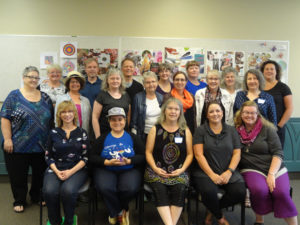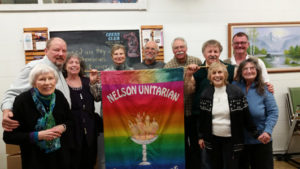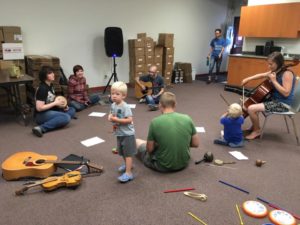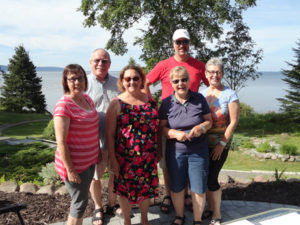Congregational Wellness
Vital congregations organize in ways that promote their mission.
Our Unitarian Universalist principles are reflected in the ways we move in the world. They are also reflected in the ways our congregations function and organize themselves.
How your congregation functions
“Don’t ask what the world needs. Ask what makes you come alive, and go do it. Because what the world needs is people who have come alive.” —Howard Thurman
Value the Traditions We’ve Built
UU congregations draw from a variety of religious and spiritual sources which inform how we come together. The member groups of the Canadian Unitarian Council are diverse, but they share many well-loved practices, some of which are described on the Worship and Faith Practices page. Explore the websites of our member congregations and learn how each group gathers!
Welcome New Ways of Gathering
Ours is a dynamic faith, open to growth and input from both our membership and the wider community. As our circumstances change and new needs and priorities arise, we may want to come together in new places or at different times; we may create new forms and ceremonies; we find endless ways to energize and renew the work of our living tradition. Connect with the CUC’s Congregational Life staff and join the congregational leaders mailing list to seek and share wisdom from across the country.
Some Resources to Inspire Your Search
Working Well Together: Strategies & Practices for Resilience & Renewal
Letter from a Hoped-For Future (UU World, spring 2015), by Rev. Rosemary Bray McNatt
Rev. McNatt is president of Starr King School for the Ministry and a contributing editor of UU World. She is also the author of Unafraid of the Dark: A Memoir (Random House, 1998).
The Unitarian Universalist Association’s Blue Boat Blog for Youth and Young Adult Ministries has some great pieces for congregations to consider as they ponder future directions.
Radical Inclusion, the keynote address of the 2013 CUC Annual Conference, by Rev. Dr. Mark D. Morrison-Reed
Small Talk: The Newsletter for Small Congregations
This newsletter is no longer published, but all issues are available online, and many offer exciting discussions and possibilities for congregations of all sizes. The January 2006 issue on transformational congregations is particularly inspiring.
Resources from the Unitarian Universalist Association of Membership Professionals to develop and support the ministry of membership.
The Future of Faith: Unitarian Universalism across Generations (video), a 2014 talk by Carey McDonald, the UUA Director of Youth and Young Adult Ministries
More resources from the Unitarian Universalist Association
The Worship and Inspiration page offers a wide range of innovative ideas.
Multisite ministry is a way for congregations to share staff, programming, and mission, enabling them to have greater impact and reach than any of them could have on their own.
Breakthrough Congregations have demonstrated an innovation or adaptation, either sustainable or a bold one-time change of great impact and meaning, that helps them to meet the challenges of a changing religious landscape.
Constructive Approaches to Transitions and Change
 Change means excitement, upheaval, and maybe some anxiety. Are you looking for positive ways to approach the journey? As always, you can connect with our Congregational Life staff and the congregational leaders mailing list. We encourage congregations to also consider speaking with local consultants with expertise in faith group transitions.
Change means excitement, upheaval, and maybe some anxiety. Are you looking for positive ways to approach the journey? As always, you can connect with our Congregational Life staff and the congregational leaders mailing list. We encourage congregations to also consider speaking with local consultants with expertise in faith group transitions.
-
-
-
-
-
-
-
- Change in Small Congregations, by Rev. Dr. Ken Brown 2009, Information about transitions and their stages, useful for leaders in congregations of all sizes.
-
-
-
-
-
-
How your congregation organizes
A congregation’s size, culture, and history influence how its board can function effectively, and the best ways for committees and working groups to relate to it.
If you think it may be time to look at the way your congregation functions, then it’s also time to contact your Congregational Life staff! We have resources and tools to help you determine if it’s time for a change. Remember:
-
-
- The relationships among congregation, board, minister, and staff tell us a great deal about how we put our values into practice.
- The goal is to build systems that foster accountability and further the mission of the congregation.
- Regularly assessing your decision-making processes and accountability structures will help you to adapt as needed, and will help you avoid the trap of “But we’ve always done it this way.”
-
The UUA offers useful guidance and resources on congregational governance.
Shared Ministry
 Ministry is the act of serving. Shared ministry is what we all—members of the congregation, paid staff, and ordained ministers—do to serve our congregation and the broader community, individually and together. Each individual brings unique gifts to contribute.
Ministry is the act of serving. Shared ministry is what we all—members of the congregation, paid staff, and ordained ministers—do to serve our congregation and the broader community, individually and together. Each individual brings unique gifts to contribute.
Ministry is everything a congregation does to fulfill its mission. Shared ministry may involve teaching in the church school, sitting on the board, working on social justice projects, singing in the choir, or volunteering at community events. Ministry is shared when individuals find ways to use their gifts to serve each other and the greater community.
The most effective form of ministry is one that shares power and responsibility between the laity and the professional clergy.
- Final Report of the Shared Ministry Task Force (2005) (pdf)
- “Shared Ministry,” an article offering reflections from five ministers, in the fall 2002 issue of the Canadian Unitarian (pdf)
- The Committee on Ministry model, a way of keeping mission and ministry at the cutting edge of congregational life
What does a board do, anyway?
 Whether yours is a congregation of 75 or 375 members, there are good reasons—and probably legal requirements—to have a board of directors. The size of your congregation will influence the way that you organize and the nature of the relationships between the various committees and the board, but the basic responsibilities of the board are constant. The board
Whether yours is a congregation of 75 or 375 members, there are good reasons—and probably legal requirements—to have a board of directors. The size of your congregation will influence the way that you organize and the nature of the relationships between the various committees and the board, but the basic responsibilities of the board are constant. The board
- helps keep the congregation aligned with its vision and mission.
- is accountable for the welfare of the congregation, by
- setting the tone,
- inviting collaboration,
- making decisions,
- mapping the direction of action,
- establishing boundaries,
- encouraging shared ministry and leadership,
- staying in touch with the mood and desires of the congregation, and
- monitoring and restraining any behavior that could threaten the board’s integrity and its accountability to the congregation.
Each of our congregations is autonomous and self-governing. Each makes its own decisions about when and how it meets, what real estate or other property it owns, how it hires and contracts with staff and ministers, and more. CUC staff will help you consider your congregation’s needs and priorities and will offer advice and guidance—not direction.
It is our goal, however, to help congregations think critically beyond their previous practices and imagine new ways to organize. We also strive to help leaders connect with others beyond their own congregation, with the goals of cooperation, education, and mutual benefit.
Legal Role of Boards
In addition to their planning and decision-making roles, boards must ensure that legal requirements are met.
-
-
- Serving on a UU Board, a video outlining the legal responsibilities of board members. Credit: Jen Rashleigh, Geoff Gomery, and the Unitarian Church of Vancouver.
- Canada Revenue Agency requirements and guidelines for charities on political activities and best practices
-
Training and Supporting Lay Leaders
All congregations, including those with paid ministers and staff, are largely run through the efforts and commitment of members. These lay leaders are the heart of our congregations. We know that congregational life is enriched when lay leaders support the ministry and mission of the congregation. We also know that leaders are more effective when they receive the coaching, training, and enrichment opportunities they need.
Skills Mapping for Volunteers
 The CUC is excited to introduce a new downloadable Volunteers Skills Mapping for Congregations designed to help Unitarian congregations assess the unique skills and interests of their volunteers. This tool will provide a clearer understanding of how each individual’s talents can best serve their community, ensuring that everyone is engaged in meaningful and fulfilling ways. By completing this worksheet, volunteers can help match their strengths with opportunities that align with their passions and expertise, fostering a stronger, more vibrant congregation.
The CUC is excited to introduce a new downloadable Volunteers Skills Mapping for Congregations designed to help Unitarian congregations assess the unique skills and interests of their volunteers. This tool will provide a clearer understanding of how each individual’s talents can best serve their community, ensuring that everyone is engaged in meaningful and fulfilling ways. By completing this worksheet, volunteers can help match their strengths with opportunities that align with their passions and expertise, fostering a stronger, more vibrant congregation.
The Congregational Life staff provide and coordinate training for leaders in many roles. Find program descriptions, dates, and other information on our events calendar.
